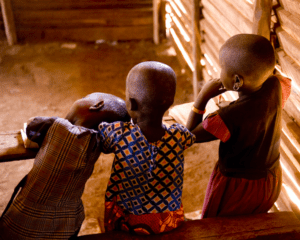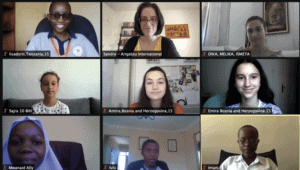08/05/2024 - From Victim to Advocate: Breaking the Cycle of FGM

It’s early morning in the village where Batula and her parents live, and as is the norm, everyone is woken up by the call for prayer. As early as thirty minutes past seven, her grandmother shows up carrying concoctions and some herbs. Batula asks her grandmother what those things are used for: “This will help you heal faster after transforming you into a woman”. This is a seven-year-old girl who is supposed to be playing but something horrendous is about to happen to her.
For decades, thousands of women have perpetrated, perpetuated, and been punished by female genital mutilation. When Batula witnessed young females, between the ages of 7 and 15, bursting into their home with their parents, she became perplexed. All of these girls will be subjected to this gruesome activity. The fact that it happens to a child makes it one of the worst nightmares that any woman may experience.
Besides the horrendous pain that Batula will go through, her emotional and mental health will also be damaged. She could even develop mental health issues such as Body Dysmorphic Disorder, a condition many victims of FGM experience and which is characterized by a distressing obsession with flaws in one’s appearance, leading to excessive self-criticism and lack of self-esteem.
When the moment arrives the circumciser asks Batula “Open your legs young girl” Tears cascading her soft cheeks, not understanding what they are doing to her. She tries to escape but she is held by two ladies, her mother and her aunt. Each holding one of her feeble legs. Batula retaliates until they put a piece of cloth in her mouth to stop her from screaming. She faces the knife, and an important part of her body is now among the trash that the stray cats look out for. The same process is repeated for up to 10 young girls, some of them willing because of the lectures given by their older aunts and their mothers about the matter.
Mental health is one of the crucial topics of our generation and is, in fact, one area that should be given greater attention. Batula’s community does not recognize mental health at all. According to them, depression does not exist. One can literally be at their lowest, and one of their own family members would comfortably say “She has demons”. “She is possessed”. This is one of the things FGM does to a young girl. It destroys her mental health as well, and it kills her will to exist on this earth. At her age, Batula is supposed to be enjoying her childhood just as normal children in the world do, but sadly, that is not the case for many young girls like her, who are forced to “act like women” at that age. “Sit upright, aren’t you a girl?” is one of the constant phrases you are likely to hear in such a household.
A few years later another ordeal befalls Batula, she is defiled by her uncle at the age of 10 in their own home and the issue is solved by a group of elderly men. This is known as “maslaha” and is the main perpetrator of the crimes committed against girls in Batula’s community. In her community crimes such as defilement and rape are not taken to court because they believe that such issues will bring shame to the community, they, therefore, invite the elders of the community, and money is paid by the perpetrator of the crime or they marry off the victim to the perpetrator and in Batula’s case the council of elders decided to marry her off to the perpetrator of the crime when she becomes older.
With this kind of unstable mind, Batula will turn 15, and she will be “ready” to get married off to one of the uncles who defiled her at the age of 10. At the age of 15, she is forced into marriage, and worse, she is married to someone who committed a crime against her. She is now forced to coexist with someone who wronged her, and society makes this feel right. Batula’s childhood has been snatched from her, and as if that was not enough, she will now spend her teenage years as a wife to a man three times her age. At that tender age, she is obligated to act as a wife and to cater to ‘wifely duties’. At the age of 17, Batula most probably will become a mother; she is supposed to take care of children, and because Batula is not aware of the crimes committed against her due to a lack of education, her children would go through the same path of life.
Education is the solution. It is the only tool that can demystify such destructive cultural habits. Education that will prioritize the younger generation, particularly young girls like Batula. With education, Batula would be able to understand the distinction between religion and culture, she would be aware of her rights as a girl, and contribute to change by promoting education in the children she raises.
I am a survivor of Female Genital Mutilation and I believe if my parents went to school and were educated this could have been prevented. I had the opportunity to go to school and learn a lot and with that, I am not taking this gruesome activity to my generation. As a young girl who grew up in a marginalized community education has changed how I see things and would advocate for education for young girls like Batula. Educating young girls like Batula could save a whole generation from the FGM pandemic.
By: Ikran (Young Kenyan Advocate for Child Rights)
The post From Victim to Advocate: Breaking the Cycle of FGM appeared first on Arigatou International.
04/10/2021 - “Things have been harder for girls” during the Covid-19 pandemic

From the closure of schools to the increase in violence and poverty, millions of children worldwide have been affected by the direct and indirect effects of the Covid-19 pandemic. Girls and young women might be among the most vulnerable due to inequality and discrimination, as was exposed by Mwanaid, a 14 years-old girl from Tanzania, during a virtual dialogue between children from her country and from Bosnia & Herzegovina, held on Saturday, August 21.
“During the pandemic, things have been harder for girls as they are doing more work at home than boys. While the boys are sent out to play, the girls are asked to wash the dishes or clean the house” explained Mwanaid during the session organized for children to reflect on the impacts of Covid-19. She also pointed out that many girls are being exposed to child labor, and other forms of exploitation, as their families, have been plunged into poverty due to the pandemic.
Emira, e 15 years old from Bosnia & Herzegovina also mentioned how violence against children has increased during this time. “Some children are victims of abuse at home, if they cannot go to school they cannot report if they have problems at their homes”.
Before engaging in a dialogue, the children from the two countries had the opportunity to have a virtual tour through the 3D exhibition Faith in Action for Children launched by Arigatou International in November 2020. This online space collects articles, paintings, and multimedia pieces produced by more than 150 children from around the world, sharing their thoughts and feelings about the pandemic and how it has impacted their lives.
The participants reflected on how similar their experiences are. As it was put by Amina, a 15 years-old girl from Bosnia & Herzegovina, despite being in different regions of the world all children have similar feelings and concerns about the pandemic. “We all want a normal life again,” she said and added that all children are eager to return to in-person classes. “It is easier to forget what we’ve learned online than when we learn it face-to-face”.
Imani, 14 years old from Tanzania, reported the same “we lose a lot of time with online classes” and Sajra, 10 years old from Bosnia & Herzegovina, also added that having to study this way is very stressful for children. “And other children give up in continuing going to school”, mentioned Lulu, a 16 years-old girl from Tanzania.
This dialogue was part of the monthly sessions that Arigatou International has been organizing during 2021 to foster interfaith and intercultural sensitivity among children from different cultures, religions, and ethnic backgrounds by sharing their views and experiences during the pandemic.
The session involved around 15 children, and it would not have been possible without the coordination and support of GNRC members in the two countries. Our special thanks to Zvonimora Jakic and Ismeta Begic in Bosnia & Herzegovina, and to Joyce Mdachi, Venance Temu in Tanzania for all the support and assistance provided to children to be able to join the online session.
The post “Things have been harder for girls” during the Covid-19 pandemic appeared first on Arigatou International.
13/07/2011 - News about the 2nd IAVE World Summit for Youth Volunteering
Call for presenters, deadline extended to July 31. Partners of the Americas (Partners), Universidad del Norte (UNINORTE), and the International Association for Volunteer Effort (IAVE) seek presenters to lead workshops and breakout panels at the 2nd IAVE World Summit for Youth Volunteering (World Summit) in Barranquilla, Colombia from November 3- 5, 2011.
The World Summit will bring together 700 youth from around the world to share best practices, to participate in training, and to highlight the important role of youth in society.
Partners, UNINORTE and IAVE are looking for dynamic youth speakers with expertise in volunteering, managing youth volunteer programs, or specific thematic areas to present during breakout panels at the Summit. Presentations may include workshops or effective practices presentations around the Summit's themes of youth volunteering and social inclusion. Guidelines and an application can be found at this link, and additional questions can be addressed to iave2011@partners.net.
The World Summit is open to youth aged 16- 30 worldwide and to adults who work with or who are interested in working with youth. Participants will engage during workshops, breakout sessions, through contests, recognition ceremonies, at cultural events that celebrate the vibrancy of the Caribbean, and by building a network of youth committed to supporting each other over the next ten years. Participants may also serve in optional volunteer projects in Barranquilla.






